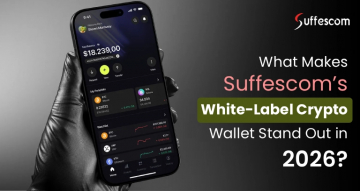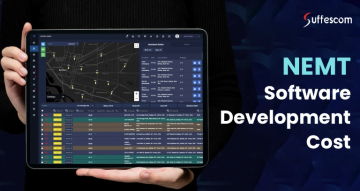How to Build a Decentralized Crypto Wallet in 2025 [Step-by-Step Guide + Must-Have Features]

In today’s digital-first economy, cryptocurrencies are no longer just speculative assets they’re a foundation of the Web3 revolution. As more individuals and businesses enter the blockchain space, decentralized cryptocurrency wallets have become essential tools for securely managing digital assets without intermediaries.
So how can you build a decentralized crypto wallet that is not only secure but also scalable, user-friendly, and ready for the future?
Let’s explore what decentralized wallets are, how they work, the types of wallets available, and most importantly how to build one that users will trust.
What Is Decentralization?
Within the blockchain, decentralization implies the exchange of supervision and decision-making from a centralized affiliation (person, organization, or bunch of individuals) to a scattered organization.
Decentralized systems endeavor to diminish the degree of belief individuals ought to put in each other and discourage their capacity. The wallet is the most important part of cryptocurrency, and the development of the cryptocurrency wallet is a sophisticated process.
Decentralization is a unique concept. While blockchain advancements often use decentralized systems, a blockchain application itself essentially cannot be classified as decentralized or not. Rather, decentralization could be a sliding scale and ought to be connected to all viewpoints of a blockchain application.
The more prominent and attractive benefits can be accomplished by decentralizing the administration of and getting to assets in an application. Decentralized app development regularly comes with trade offs such as lower exchange throughput, but in a perfect world, the trade offs are worth the progressed steadiness and benefit levels they deliver.
Create Your Own Decentralized Cryptocurrency Wallet
Create your own Cryptocurrency wallet dApp to allow yours app users to store and retrieve their digital assets. We have experts to build decentralized crypto wallets for Blockchain projects, DEXs, DeFi Trading and Investment platforms.
What Is a Decentralized Crypto Wallet?
A decentralized cryptocurrency wallet is a non-custodial software application that gives users full control over their digital assets. Unlike centralized wallets that store keys on behalf of users, decentralized wallets allow individuals to manage their public and private keys directly, interacting securely with the blockchain.
These wallets are essential for:
- Storing and transacting cryptocurrencies like Bitcoin, Ethereum, and USDT.
- Connecting to DEXs, DeFi protocols, and Web3 dApps.
- Eliminating third-party control over asset ownership.
The crypto wallet helps the proprietor keep their digital money safe and secure with easy accessibility to sell or purchase. Building a decentralized crypto wallet is a matter of experts as it is going to hold the crypto worth millions, and any mistake while developing the platform can easily hack the platform; so for the development, hire a dedicated crypto wallet development company who are well known for the developing such applications.
How Does Crypto Wallet Work?
You wish two things to execute in crypto – the primary is your wallet address, which is additionally known as your open key, and the second is your private key. A public key is a kind of similar to a bank account number. You'll be able to share your bank account number with other individuals or institutions to send or get cash. So also, you'll be able to share your public key, which is your wallet's address, to get the crypto.
You can consider a private key as the PIN or password of the banking account. With the name of the key, it is quite understandable that the key should not be shared with anyone, just like we don't share our password of net banking or debit card or credit card. The sharing or private key may affect your crypto wallet as the hacker, or any random person will get direct access to the wallet. A private key provides access to the cryptocurrency and buys or sells digital money.
Suppose when the person wants to transfer the cryptocurrency to anyone for any reason, either purchasing or receiving, you coordinate your crypto sender to a special cryptographic address issued by your wallet.
So, the cryptocurrency wallet doesn't specifically hold your crypto coins inside your wallet – They live on the blockchain. Since the cryptocurrency isn't shown in any physical frame, the crypto wallet keeps the data related to your open and private keys and your possession stake of the crypto.
With the assistance of both of these keys, you'll be able to send or get cryptocurrency whereas keeping your private key encrypted.
Types of Crypto Wallets
Crypto wallets come in various forms, and the choice depends on the user’s needs and trading habits. Below are the main types of wallets, each suited for different purposes.
Whether a wallet connects to the internet categorizes it as either a hot wallet (online) or a cold wallet (offline). For long-term holders prioritizing security, a cold wallet is ideal. For active traders needing quick access, a hot wallet is more practical.
Cold Crypto Wallet
Cold wallets store keys offline, disconnected from the internet, offering maximum security. They are often compared to USB drives or physical storage devices. Paper wallets, which store key information on printed paper, are another form of cold storage. Cold wallets are considered the most secure, as their offline nature makes them difficult to hack. However, they can be lost or damaged easily.
Paper Wallets
Paper wallets are physical documents containing your public and private keys. They offer high security but are fragile—if lost or damaged, you risk losing access to your cryptocurrencies. Paper wallets also make partial transactions cumbersome and are time-consuming for frequent trading.
Hardware Wallets
Hardware wallets are a modern evolution of paper wallets, storing private keys on a physical device (like a USB drive) in an offline environment. They are user-friendly, as they can connect to computers or other devices via USB without exposing the private key online. Transactions are signed offline and then broadcast to the blockchain.
Popular hardware wallets include Trezor and Ledger, known for their reliability and security.
Software/ Hot Wallet
A software program wallet is an application downloaded on a device; it can be a desktop or a portable gadget, or it may well be a web-based wallet that can get online. Breadwallet, Jaxx, and Copay are the dominant program wallets. We can advance and categorize program portfolios into desktop, online and multi-purpose portfolios.
Desktop Wallet
Desktop wallets are cold wallets when disconnected from the internet, storing private keys on your computer. They allow offline transactions and can be reconnected later. If the primary server fails, the desktop acts as a backup. However, the computer must be secure, as malware or hardware failure could compromise the wallet. Electrum is a popular desktop wallet.
Online Wallet
These are other sorts of hot wallets that run on the Web. Clients have the advantage of getting to these wallets across any gadget. It may well be a tablet or a desktop. Otherwise, you can get to it from your mobile browser. The private key is managed by a third party and is stored online.
Mobile Wallet
Mobile wallets are similar to online wallets but are designed for mobile phone use and availability. These wallets have a user-friendly interface that makes a difference you are doing transactions easily. Mycelium is the most excellent accessible, versatile wallet. A mobile wallet may be a program introduced on a portable gadget to store a user's installment information, counting crypto and monetary account APIs. In crypto, portable wallets are regularly mobile-based applications that store private keys.
Separated from putting away, a versatile wallet empowers clients to send and get virtual monetary standards. These applications are accessible on driving app stores such as Play Store for Android and App Store for iOS devices.
How To Build Decentralized Crypto Wallet Platform?
Understand Crypto and Blockchain
Blockchain innovation plays an imperative part in crypto app development. If you're looking to construct a crypto wallet app, you would like to begin by investigating the world of blockchain and cryptocurrencies. Blockchain is a promising and scalable innovation that produces digital currencies (cryptocurrencies), much like the Web makes emails conceivable. As the title recommends, a blockchain could be a chain of blocks where the pieces contain computerized data (information). The chain is the cryptographic guideline utilized to put through the information squares. The full reason for utilizing it is to permit the sharing of profitable information in a secure way.
- Utilizing application programming interface APIs may be an incredible way to build a feature-rich cryptocurrency wallet app. After you utilize a disseminated record, API will permit you to synchronize your crypto wallet with the blockchain ecosystem easily. Here are some of the foremost prevalent APIs you'll select from – Coinbase, Bitcore, and Factom.
- At this step, you must select the proper cloud platforms for your app. You'll pick to select PaaS (Platform-as-a-service) if you are going in for web application development. But, for a crypto wallet app improvement, you must seek a BaaS (Blockchain as a Benefit) supplier and coordinate their cloud benefit into your app. Companies like Amazon and Microsoft advertise BaaS items.
Hire The Most Reliable Crypto Wallet Development Solutions Provider!
Suffescom Solutions helps businesses turn their ideas into successful digital realities. We excel in creating most reliable crypto wallet development solutions which can help users enjoy transactions in a speedier & secure environment.
Depending on your prerequisites and demand, you'll select either of them and create a secure cryptocurrency wallet app.
- Research the competitors in the marketplace before keeping the toe into the marketplace. Knowing about the marketplace's demand and the user is really important for any business, and so in this too. The other aspect that also depends on the business is identifying the competitors. Track the competitor's actions, what they are doing and how they direct the users towards them.
- Choose the best crypto wallet for android and iOS developers to build the platform to generate revenue from the platform. There are multiple service providers for building the platform. Still, Suffescom Solutions is one of the leading companies and has also won multiple awards for providing services on Web3.0 and blockchain.
Final Thoughts
Building a decentralized crypto wallet is no longer optional—it's a strategic move for businesses diving into blockchain, DeFi, and Web3. Whether you want to launch a standalone wallet or integrate one into your larger crypto ecosystem, now is the time to invest in secure, future-ready wallet technology.
FAQs
1. What is a decentralized crypto wallet?
A decentralized crypto wallet is a software application that allows users to store, manage, and transact cryptocurrencies like Bitcoin or Ethereum without relying on a centralized authority. It interacts directly with the blockchain, using public and private keys for secure transactions.
2. Why is a crypto wallet necessary for cryptocurrency transactions?
Unlike fiat currency, cryptocurrencies exist only on the blockchain and require a wallet to manage ownership. A crypto wallet stores the public and private keys needed to send, receive, or store digital assets securely.
3. What’s the difference between hot and cold wallets?
Hot wallets are connected to the internet (e.g., mobile or online wallets), offering convenience for frequent transactions but with higher security risks. Cold wallets are offline (e.g., hardware or paper wallets), providing greater security but less accessibility.
4. How secure are decentralized crypto wallets?
Decentralized wallets are highly secure when built with robust encryption and proper key management. Cold wallets are the most secure due to their offline nature, but all wallets require careful handling of private keys to prevent unauthorized access.
5. Can I build a crypto wallet without blockchain expertise?
While basic knowledge is helpful, hiring an experienced development team with blockchain expertise ensures a secure and functional wallet. Companies like Suffescom Solutions specialize in creating customized solutions, including White Label Crypto Wallet platforms, which allow businesses to launch branded wallets quickly and efficiently.







